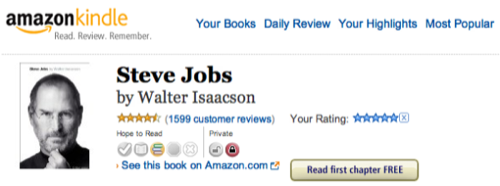
Continuing our Social Books series, today I’m looking at book highlights. The increasing popularity of e-readers, in particular the Kindle, has made it common practice to highlight passages and quotes within books. There have been various efforts to make those highlights social and today I’ll look at the two leading services. One is from Amazon itself, called Kindle Profiles. The other is a startup called Findings. As if to prove that not everything is social, this time the anti-social service is winning…
Last year Amazon launched Kindle Profiles, a kind of homepage on the Web for your Kindle reading. But while indie social network Goodreads has almost doubled its user base over the past year, to now boast 10 million registered users, Kindle Profiles hasn’t captured the imagination of book fans online. That’s because a lot of Kindle activity is private by default. In other words, Kindle Profiles isn’t as social as Goodreads.
It’s not that Kindle Profiles doesn’t offer social options. It does, but they’re usually turned off by default. What’s more, the social options in Kindle Profiles seem almost half-hearted. Take its Facebook integration, for example. Compare the long list of things you can update your Timeline with on Goodreads, to the meagre “change the status of a public book” actions in Kindle Profiles:

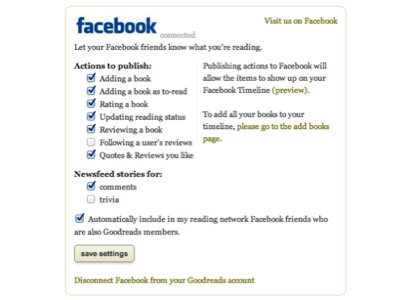
Kindle Profiles: Geared Towards Private Highlights
Here’s how Kindle Profiles works. It lists out all of the books you have purchased on Amazon, or that are on your wish list. These aren’t necessarily Kindle books either – the paper-bound books you bought or wish to buy are included in your books list. Each book in your list has a reading status and rating, which is populated from your Amazon profile if available.
The most useful aspect of Kindle Profiles for me over the past year, since I last reviewed it in August 2011, has been the Your Highlights section. This displays all of the – mostly private – highlights I have made in Kindle e-books. I read a lot of non-fiction and highlight passages that interest me. So Kindle Profiles gives me a great archive on the Web of those highlights, for my future reference. I can also save them to Evernote (which I have done for a few recent books).
Why haven’t I made my Kindle Profiles highlights public? Because I can’t be bothered changing them from the default private. I see no need to either, since I’m not overly interested in what other people have highlighted in a book I just read myself.
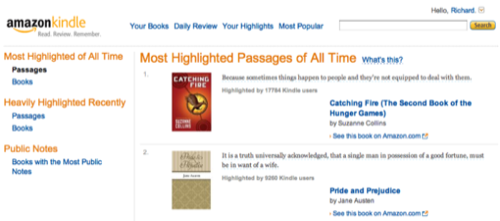
Amazon doesn’t seem that concerned about marketing Kindle Profiles as a social tool. In my review last year, I remarked that “as Facebook has done over the past couple of years with its initially private service, over time Amazon will likely prompt and tease you to make your private content public.”
But Amazon hasn’t done that. Judging by the Books with the Most Public Notes page, a relatively small proportion of Kindle users are making their notes public. The Steve Jobs biography by Walter Isaacson, number 5 on that list, has public notes by 485 people (make that 486, as I just made mine public too – what the heck). 486 Kindle readers with public notes is nothing to be sneezed at, but it’s probably a small percentage of the total Kindle readers who made highlights in this highly quotable Jobs biography.
Findings: Goes Straight For The Public Highlights
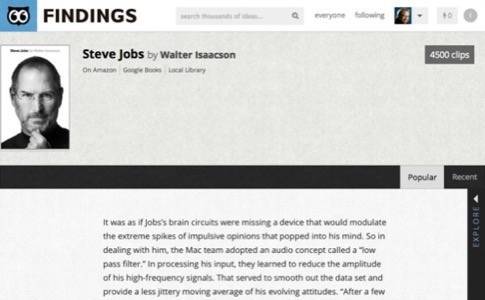
While Amazon keeps Kindle Profiles a mostly private affair, a startup is making a bold attempt to turn book highlights and quotes into social objects. Findings was launched in October last year by writer Steven Johnson, BetaWorks Founder and CEO John Borthwick and developer Corey Menscher.
Findings can import your book data from Kindle, via a browser bookmarklet. Interestingly, Findings has opted to make your Kindle highlights public by default. The bookmarklet page warns:
“All of your Kindle highlights (regardless of whether they are marked public or private on Amazon) will be synced to Findings and default to public visibility.”
While I can see the rationale in reversing the privacy settings of your Kindle highlights in bulk (to make Findings social out of the box), it’s also quite presumptuous. Your Kindle Highlights may be private for a reason – for example, you are reading a job hunting book and don’t want your highlights to be made public. Sure you can change the public setting for a particular book back to private, but it’s easy to forget to do that.
Update: The day after this post was published, Findings announced that Amazon has requested the Kindle sync functionality be removed: “Another part of our service has been the ability to make your Kindle reading more social by importing and sharing your Kindle highlights. A few days ago, Amazon formally notified us that they believe this functionality violates their terms of service.”
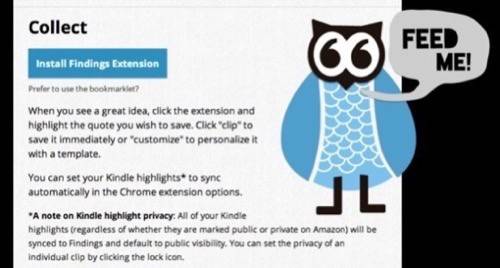
So are book highlights as social objects going to be a phenomenon? I’m skeptical. Highlighting and note-making in e-books is a personal thing. I make highlights in a book because I want to remember a passage or idea in it. While I am curious sometimes to see what other people highlighted from a book I read, it’s far more valuable to me to see what books other people are reading – and Goodreads is the place to go for that.
So I think Amazon is doing the right thing by keeping highlights and notes private by default. Well, let’s face it – Amazon doesn’t stand to gain much by giving external parties (like Findings) that valuable reader metadata. So it’s simply choosing the path of least resistance.
While I admire the gumption of Findings to try and make highlights social, it will be an uphill battle fighting Amazon’s privacy settings and Goodreads’ social momentum.










